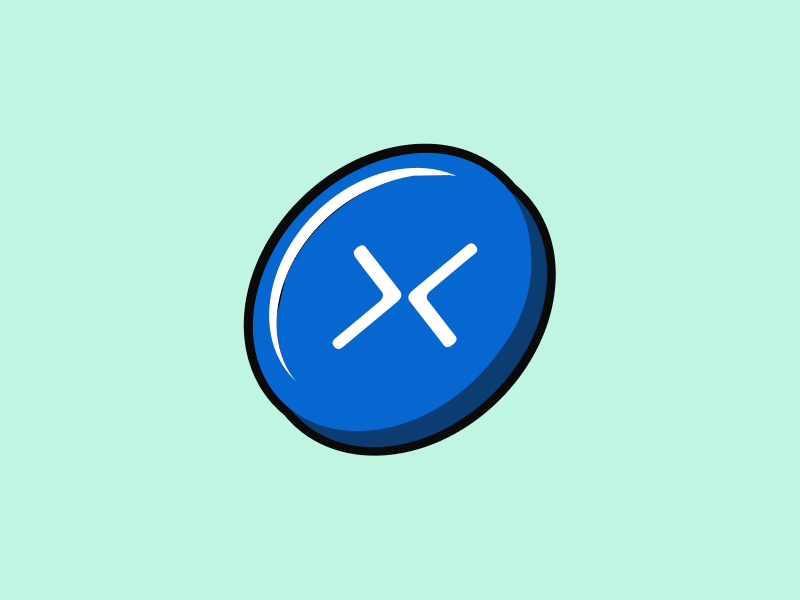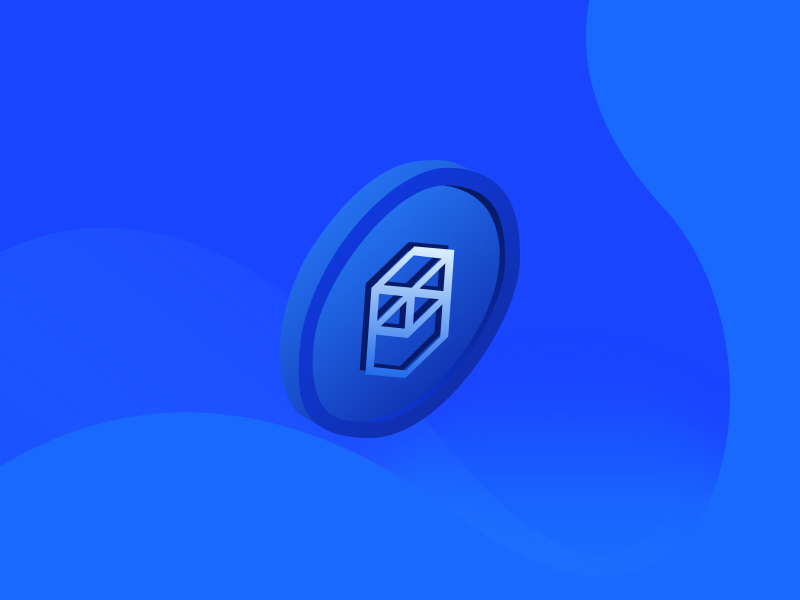Super Apps for Crypto Gamers, What is Beam?

While most protocols focus on creating a web3 game, Beam comes up with a different concept. It creates a specialized blockchain for web3 games. Beam aims to be a one-stop platform for web3 gamers. On Beam, users can also trade in-game assets and mint omnichain NFTs. So, what exactly is Beam? How does it work? Check out the full explanation in the following article.
Article Summary
- 🎮 Beam is a specialized gaming blockchain created by Merit Circle DAO that operates on the Avalanche network. It enables efficient in-game transactions and facilitates omnichain NFT minting.
- 🕹️ Some of the key features of Beam are Beam Hub, Beam Companion App, and Sphere, as well as support for swap and bridge tokens.
- 🔆 Beam’s key advantages are the speed and efficiency of the Avalanche blockchain, a one-stop gaming platform, and blockchain interoperability.
- 🪙 BEAM is Beam’s native token for transaction fees in Beam and governance in the Merit Circle DAO.
What is Beam?
Beam is a specialized gaming open-source blockchain launched by Merit Circle. It utilizes blockchain in game development and in-game asset trading. BEAM promised to improve the gaming experience of its users.
Beam is built using the Avalanche network. However, it operates as an Avalanche subnet. This makes Beam both an independent blockchain and part of an interconnected network. This allows it to benefit from the scalability, speed, and security features of Avalanche while still being able to focus on gaming.
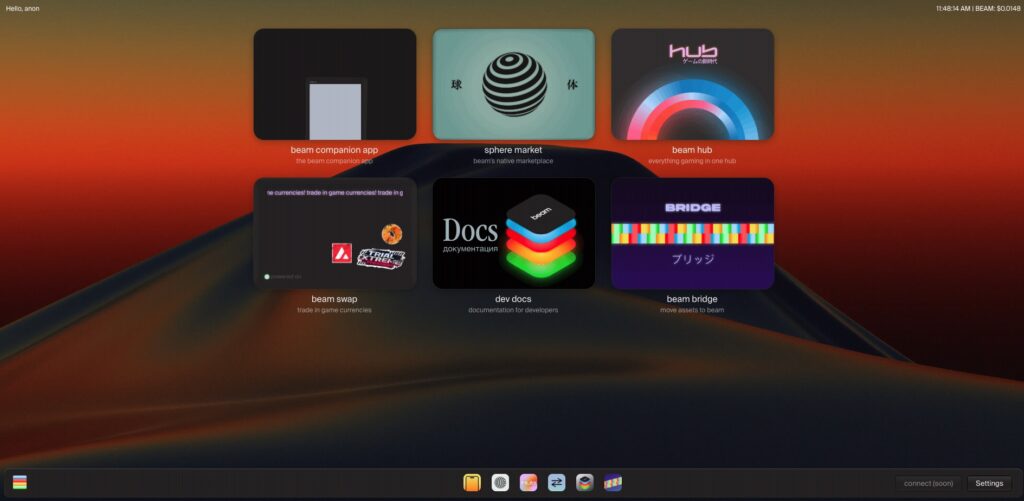
In addition, Beam also uses LayerZero technology, allowing users to mint game assets as omnichain NFTs. This allows NFTs to be transferred to other chains easily.
Do not confuse Merit Circle's Beam with another protocol with the same name, BEAM. BEAM is a privacy-focused blockchain. Both use the BEAM ticker for their tokens. However, the difference lies in brand capitalization name. Beam for the focus of this article, and all-caps BEAM for the privacy platform).
To better understand Beam and its ecosystem, find out more about the world of GameFi in this article.
Who Founded Beam?
Beam was built and launched by Merit Circle, a Decentralized Autonomous Organization (DAO) that supports and promotes the Web3 gaming platform. As a DAO, decisions for funding gaming projects are determined through voting.
Merit Circle has four primary keys to its operations. First, Merit Circle’s funding focuses on promising tokens, NFTs, and yield farms. Second, Merit Circle Studios supports developing and incubating new gaming projects. Third, Merit Circle Gaming provides gaming libraries, tools, and educational assistance for developing gaming projects. Fourth, Sphere- Merit Circle’s marketplace, facilitates in-game asset trading.
How Does Beam Work?
Thanks to the Avalanche architecture, Beam gives users a fast transaction experience at a low cost. Both are important factors for players and game developers. This is due to the fast-paced nature of modern play-to-earn games and the wide variety of in-game assets within.
Like most Avalanche subnets, Beam has its own set of validators. Currently, there are only eight validator blocks on the Beam mainnet. However, given that Beam has opened its network to the public, this number will likely increase as the platform matures.
Currently, Beam uses the Proof of Authority (PoA) consensus mechanism. Beam uses PoA to ensure quality and security since each entity on the network is verified and trusted. However, Merit Circle has plans to replace Beam’s consensus mechanism with Proof of Stake (PoS) by 2024.
Beam Features
The following are some of the Beam’s key features:
1. Beam Hub
Beam Hub is the first product launched by Beam. It is a platform that provides information about all web3 games. So, Beam Hub not only features games on Beam but also popular games from other networks. When writing this article, there were already 186 games featured on the Beam Hub.
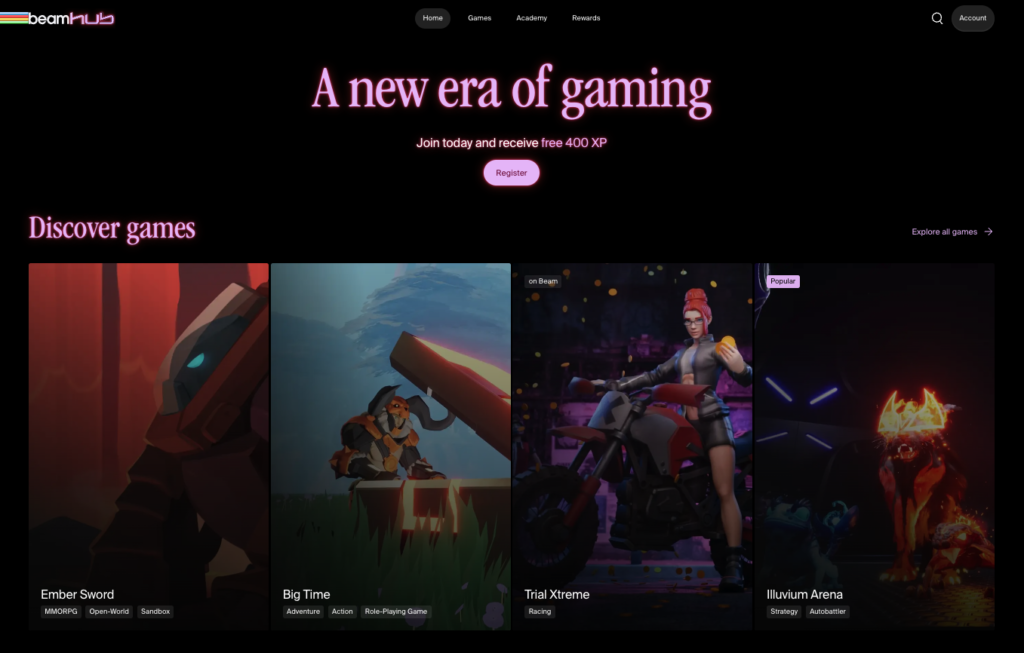
Beam Hub also has an educational channel related to web3 games. In Beam Academy, users can access information about web3 games, web3 technology, and guides to playing various popular games. In addition, there is also a reward channel for users who follow and complete the tasks given.
2. Beam Companion App
In web-3 games, obtaining and owning in-game assets can be quite a hassle. Even more so for newbie gamers. Hence, Beam presents the Beam Companion App. It is an app that will act as your companion in the web3 gaming journey.
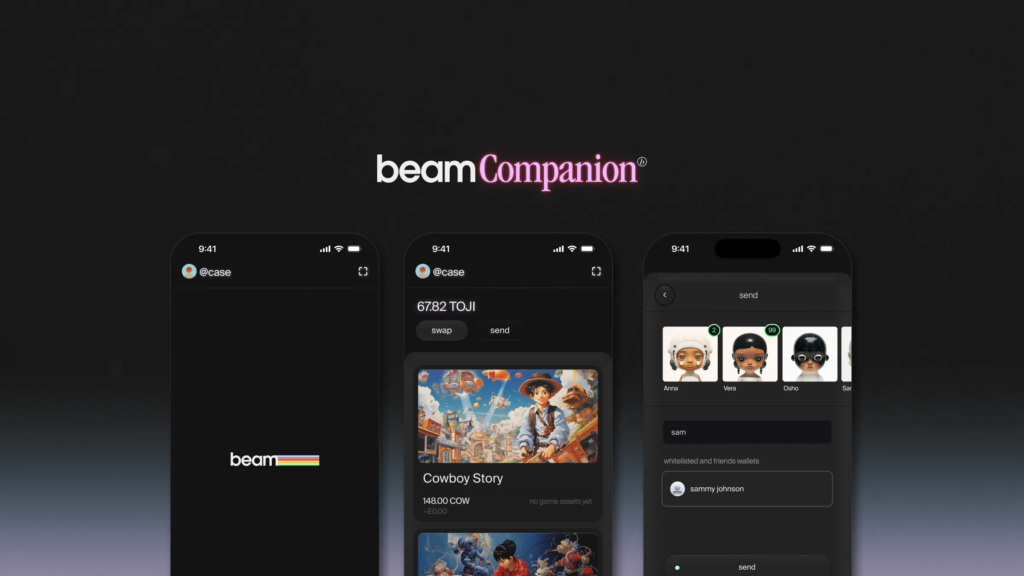
The Beam Companion App is useful for organizing accounts and in-game assets from the various games in the Beam ecosystem. It can help gamers take ownership of game assets when needed. In addition, users can also swap tokens, send in-game items to other users, and lock valuable items when not playing the game.
3. Sphere
Sphere is a marketplace for various in-game assets. Users can trade their in-game assets through Sphere, such as weapons, characters, skins, accounts, and ownership certificates. For buying NFT, users are only charged a gas fee, while sellers are charged a 2.5% trading fee and royalties (the creator determines the amount).
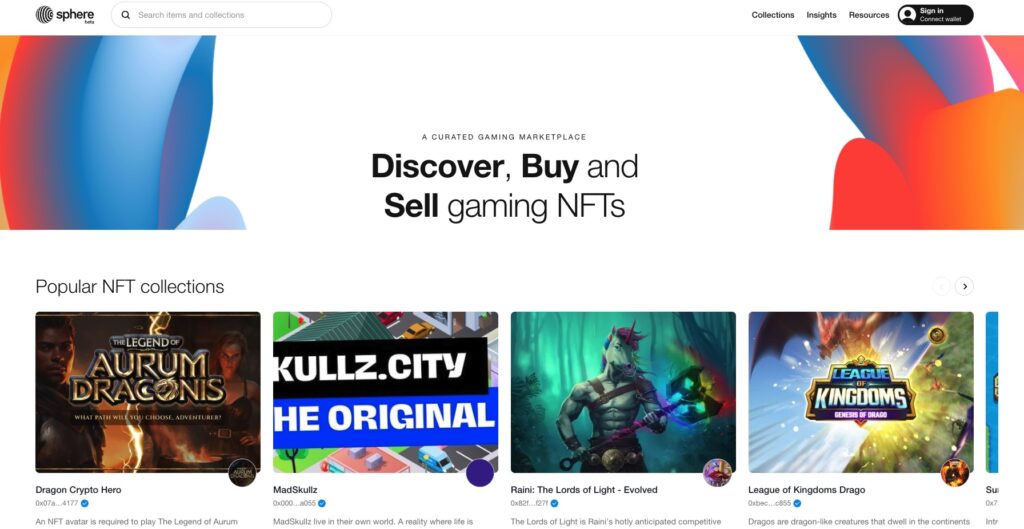
Sphere uses Seaport to ensure the security of its platform transactions. Sphere is currently in the beta phase, so some of its features are unavailable. One feature that is being prepared is the assessment of the rarity of a collection without using rarity tools.
Want to try trading NFTs? Follow the NFT trading guide here.
4. Beam Swap dam Bridge
To facilitate and enhance the user experience, Beam also has Swap and Bridge features. With Beam Swap, users can swap in-game currency easily. Supported tokens include BEAM, AVAX, GOB, RST, USDC, USDT, and WBEAM.
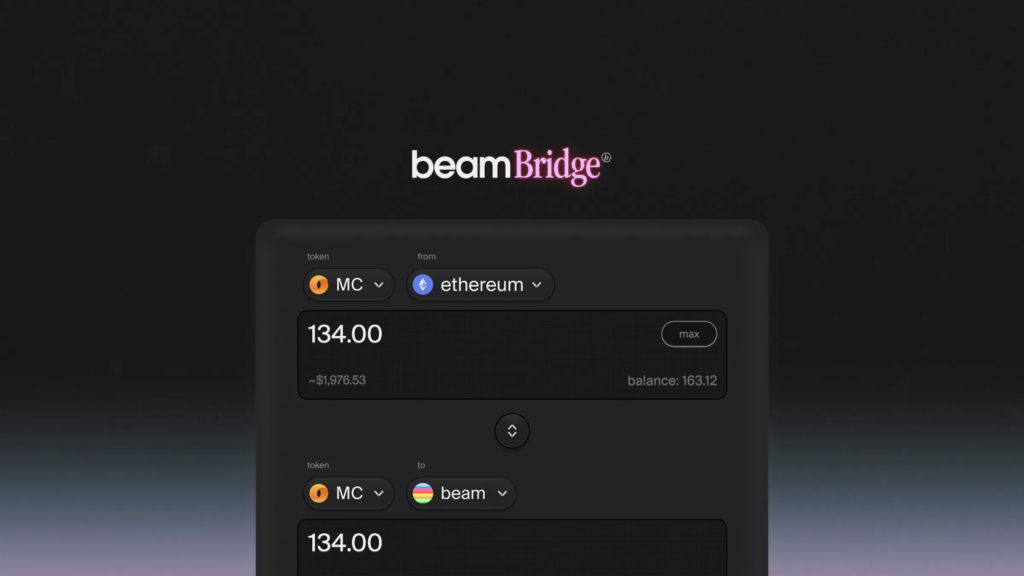
As for Beam Bridge, Beam uses LayerZero technology for bridging to and from Beam. To access both, users only need to connect their wallets.
5. Beam SDK
If the previous feature was for gamers, the following feature is aimed at the development team. The next feature is the Beam SDK, an all-in-one toolkit for game creators. It offers a variety of tools for developers to integrate blockchain components and structures into their games.
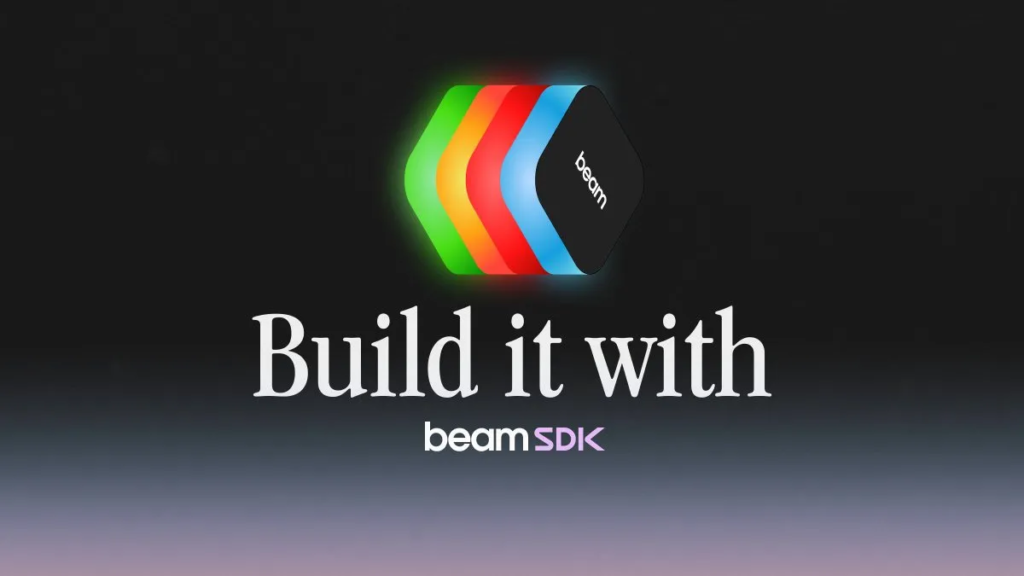
With the Beam SDK, developers can control accounts, trades, swaps, sponsored transactions, and more. Beam will not regulate how or when the SDK is used. All decisions and methods will be left to the development team as they see fit.
Beam’s Advantages
- 🎮 Web3’s unified gaming ecosystem. Beam is one of the pioneers of platforms focusing on the gaming ecosystem, unlike Decentraland or Axie Infinity, which focuses more on one game. Beam wants to be a platform for a variety of other games. In a way, it could become the Google or Amazon of blockchain gaming.
- ⛓️ Inherits Avalanche features. The majority of crypto gaming platforms are built on Ethereum. In the event of network congestion, gas fees can become very expensive. In contrast, Avalanche has a much cheaper cost efficiency.
- 💡 One-stop solution. With many features, Beam can be a one-stop solution platform for gamers. They can play games, trade, manage in-game assets, swap and bridge through Beam. Users no longer need to move between platforms.
- 🌐 Cross-chain support. Thanks to LayerZero technology, Beam has high interoperability. This makes transactions and interactions between chains easier while unifying the gaming landscape.
Also, read what LayerZero is and how it works.
BEAM Token as Investment
The BEAM token is the native token for the Beam blockchain. All transaction fees in the Beam ecosystem are paid in BEAM. BEAM also plays a vital role in the governance of the Merit Circle DAO. By owning BEAM, users can participate in the Merit Circle DAO governance.
Later, when Beam fully transitions to PoS, BEAM tokens can also be used for staking.
BEAM was launched on October 26, 2023, with a total supply of 63 billion. Currently, 46.28 billion BEAM tokens are already circulating in the market. When launched, the price of BEAM was at US$ 0.005. Meanwhile, as of December 7, 2023, the price was at US$ 0.016 or increased by 220%.
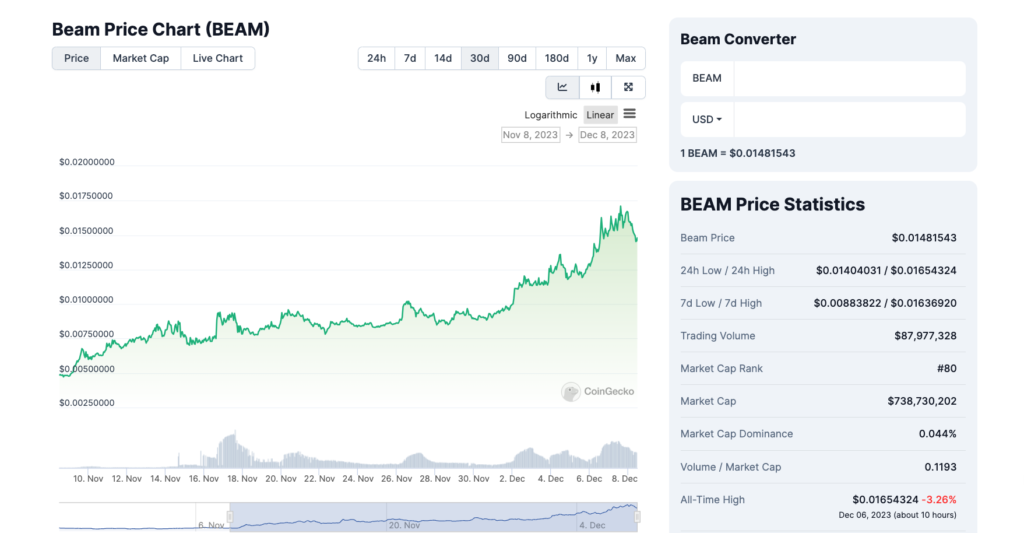
BEAM is expected to be one of the leading tokens in the gaming sector due to its gaming ecosystem. Additionally, the GameFi sector is evolving with the emergence of new generations of GameFi projects. If the GameFi narrative becomes dominant again, similar to in 2021, BEAM may be the token that receives positive sentiment.
Are you interested in investing in GameFi’s new projects? Find out the list of other potential projects here.
Conclusion
As an open-source gaming-specific blockchain, Beam has the potential to revolutionize the use of blockchain in game development and in-game asset transactions. It has several advantages, including high scalability, speed, and security. Beam also supports omnichain NFTs minting through integration with LayerZero, allowing the generated NFTs to be easily transferred to various blockchains.
Beam offers key features such as Beam Hub, Beam Companion App, and Sphere, as well as support for swap and bridge tokens. The BEAM token, used for transactions and governance of the DAO Merit Circle, has shown significant gains since its launch. If the GameFi narrative becomes dominant again, BEAM’s positive trend will likely continue. Making it one of the most interesting gaming sector tokens to collect.
How to Buy BEAM on Pintu
After knowing what beam is, you can start investing in BEAM by buying it on Pintu app. Here is how to buy crypto on Pintu application:
- Create a Pintu account and follow the process of verifying your identity to start trading.
- On the homepage, click the deposit button and top up the Pintu balance using your preferred payment method.
- Go to the market page and look for BEAM.
- Click buy and fill in the amount you want.
- Now you have BEAM!
In addition to BEAM, you can safely and conveniently purchase a wide range of cryptocurrencies such as BTC, ETH, SOL, and others safely and easily on Pintu. Pintu diligently evaluates all its crypto assets, highlighting the significance of being cautious.
Pintu is also compatible with popular wallets such as Metamask to facilitate your transactions. Download Pintu app on Play Store and App Store! Your security is guaranteed because Pintu is regulated and supervised by Bappebti and Kominfo.
Aside from buying and trading crypto assets, you can expand your knowledge about cryptocurrencies through various Pintu Academy articles. Updated weekly, all Pintu Academy articles are made for knowledge and educational purposes, not as financial advice
Reference
- Beam Docs, Introduction to Beam, accessed on 6 December 2023.
- Merit Circle, Welcome to Beam: opening the network, Medium, accessed on 6 December 2023.
- Adam James, Beam aims to become the new blockchain gaming hub on Avalanche, The Block, accessed on 6 December 2023.
- Merit Circle, Beam integrates LayerZero omnichain interoperability protocol, Medium, accessed on 6 December 2023.
Share
Related Article
See Assets in This Article
BEAM Price (24 Hours)
Market Capitalization
-
Global Volume (24 Hours)
-
Circulating Supply
-
